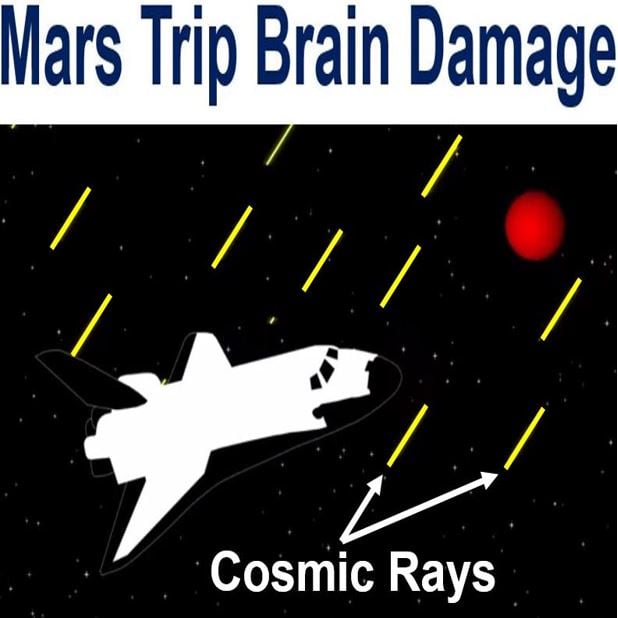Mars astronauts could risk serious brain damage from galactic cosmic rays – extremely high-energy radiation, mainly originating outside the Solar System – according to a radiation oncology study carried out by scientists from the University of California, Irvine, and the University of Nevada, both in the United States.
The damage would occur during the trip to Mars plus the return voyage, the research team explained in the journal Science Advances (citation below).
According to animal studies, astronauts’ brains would probably be besieged by destructive particles that could permanently impair cognition, i.e. undermine the brain’s ability to think and learn properly.

The galactic cosmic rays go right through the spaceship and would damage the astronaut’s brain. (Image: YouTube)
Professor Charles Limoli, who works at the Cancer Research Institute, part of the University of California, Irvine, and colleagues, found that exposure to highly energetic charged particles – similar to those found in the galactic cosmic rays that astronauts are exposed to during long spaceflights – cause considerable damage to the central nervous system, leading to cognitive impairments.
“This is not positive news for astronauts deployed on a two- to three-year round trip to Mars.”
“Performance decrements, memory deficits, and loss of awareness and focus during spaceflight may affect mission-critical activities, and exposure to these particles may have long-term adverse consequences to cognition throughout life.”
Animal study finding not encouraging
In this animal study, rodents were exposed to doses of fully ionized oxygen and titanium (charged particle irradiation) at the NASA Space Radiation Laboratory at the Brookhaven National Laboratory. They were then studied at Prof. Limoli’s Irvine laboratory.
Prof. Limoli and colleagues found that being subjected to these particles resulted in brain inflammation, which disrupted the transmission of signals between neurons (brain/nerve cells). According to imaging studies, the brain’s communication network was damaged through reductions in the structure of spines and dendrites (nerve cells).
Structural changes combined with additional synaptic alterations significantly undermined the nerve cells’ capability to efficiently transmit electrochemical signals.
The rodents’ performance in learning and memory tests declined considerably after being exposed to charged particle irradiation.
The authors said they had seen similar types of severe cognitive dysfunction in brain cancer patients after receiving various photon-based radiation treatments at high doses.
While cognitive impairments in astronauts would take months before they were noticeable, Prof. Limoli said, as a Mars trip is several months long (plus the return journey), the cognitive deficits would develop during the voyage.
When astronauts spend prolonged periods on the International Space Station, they are not exposed to the same level of bombardment with cosmic rays, because they are protected by Earth’s magnetosphere.

Adding extra shielding to sleeping and resting quarters may help, Prof. Limoli (above) commented. But even then, cosmic rays would still get through. (Credit: Steve Zylius / UC Irvine)
So, how can Mars astronauts be protected?
The authors suggest designing the spacecraft so that there are areas with stronger shields, perhaps where the astronauts rest and sleep. However, these galactic cosmic rays will go through the spaceship nonetheless “there is really no escaping them,” they add.
It is possible some types of preventative treatments might help.
Prof. Limoli said:
“We are working on pharmacologic strategies involving compounds that scavenge free radicals and protect neurotransmission. But these remain to be optimized and are under development.”
The authors concluded in an Abstract in the journal:
“Our data indicate an unexpected and unique susceptibility of the central nervous system to space radiation exposure, and argue that the underlying radiation sensitivity of delicate neuronal structure may well predispose astronauts to unintended mission-critical performance decrements and/or longer-term neurocognitive sequelae.”
The study was funded by NASA.
Citation: “What happens to your brain on the way to Mars,“ Vipan K. Parihar, Barrett Allen, Katherine K. Tran, Trisha G. Macaraeg, Esther M. Chu, Stephanie F. Kwok, Nicole N. Chmielewski, Brianna M. Craver, Janet E. Baulch, Munjal M. Acharya, Francis A. Cucinotta, Charles L. Limoli. Science Advances. Published 1 May, 2015. DOI: 10.1126/sciadv.1400256.
Video – Mars travel and brain damage
In this video, Prof. Limoli explains how long-term galactic cosmic ray exposure leads to dementia-like cognitive impairments.
